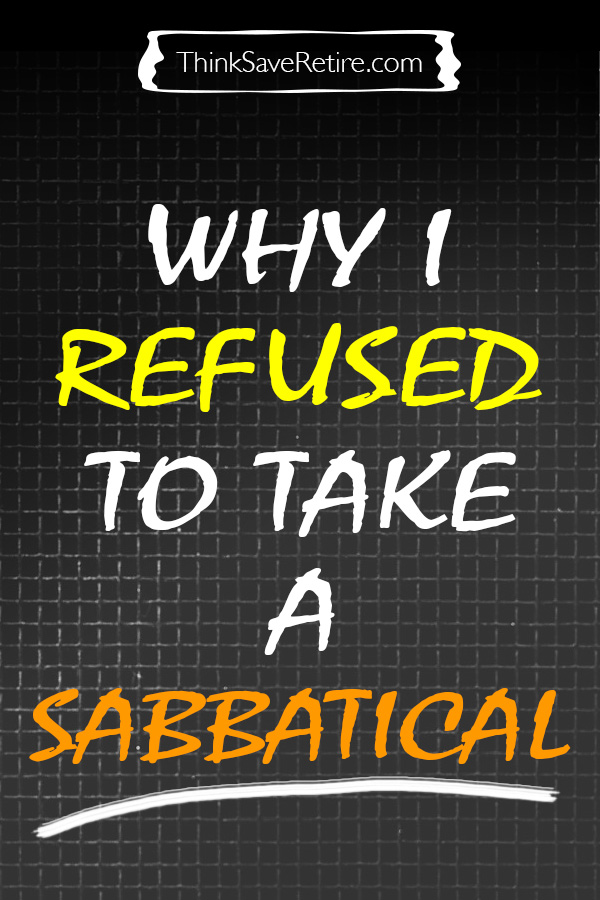Why I refused to take a sabbatical and quit instead
When I told my boss that I am quitting in December to travel, he suggested taking a sabbatical instead of quitting outright. Perhaps a sane person would have accepted the sabbatical. I, however, did not.

When I told my boss that I am quitting in December to travel, he suggested taking a sabbatical instead of quitting outright. Perhaps a sane person would have accepted the sabbatical. I, however, did not.

At most companies, a sabbatical (or a leave of absence) means that you get to keep your job and return when your sabbatical is over. However, you'll spend your sabbatical time unpaid by the company. Either side can terminate the agreement, as well, at any time.
For me, this would amount to a fallback. If, for whatever reason, this whole early retirement from full-time work thing doesn't work out in a year, I could return to my high-paying job as if nothing had happened. It seems like a win-win situation.
Why not take the sabbatical fallback?
I quickly dismissed the sabbatical option for several reasons:
I have no interest in returning to this line of work. When dissatisfaction with your job is the primary motivating factor of financial freedom, the last thing you want to do is return to that job - even if things go south. This job represents what I am escaping from. I find very little satisfaction from working in Information Technology full-time. Why, then, would I ever want to return to it? If things don't turn out as I had expected them to, perhaps that would be the time to choose another career route.
Here is the real truth: I made the mistake of making my hobby my career. I was the nerd teaching himself web development and writing software as a teenager. I genuinely liked it, and I still do. What I don't like, however, is doing this work for a company. It can be a very stressful business, and companies tend to demand a lot out of their IT staff. IT careers, while high-paying, can drain the life out of you. I want this stuff to be my hobby, not my job.
I do not want that decision hanging over my head. I know myself. As the end of my sabbatical gets closer and closer, I will naturally think about it more and more. That decision will be a distraction from what I am doing at the time. I do not want to think about whether or not I want to return. Instead, I'd rather pass the time doing things that I enjoy. I am already putting those pieces together for my post-retirement life in IT.
If you hate public speaking, this decision is that presentation that you have to give in two months. If you abhor the dentist, this is that appointment on your calendar in six months. If you can't stand having your in-laws over for Christmas...okay, you get the idea. This is that nagging thought in the back of your mind that gnaws at your brain every once in a while, buried not-so-deeply into the gooyness of your subconscious. It never retreats until it's over.
I do not want to give myself an "out". I want this decision to be final. Okay, I know that it's not "truly" final (almost anything can be undone), but I don't want it to be easy. If things get tough, I want that extra push to remain flexible and get through. I never want to say "Well, I can always just go back to my old job for another year". That's too easy.
When I officially quit on December 23rd, I want to be done. Like, DONE done. Finito. I want that day to mark the beginning of the transition from full-time worker-bee in corporate America to a financially independent member of society doing whatever the hell I enjoy. No further relationship with my former company. I want to believe that the door is closed and will never re-open again.
I guess it's a form of closure. I am slamming the book shut on the accumulation phase of my life that required working a job to build wealth. Now, it's the next phase that includes maintaining wealth through passive income and work that I happen to enjoy doing. In a way, it's the risk of no fallback that is what will keep me focused and motivated.
I want to close this door and open up the next rather than "keep a foot in the door" from my previous life.
Why take a sabbatical in the first place?

A sabbatical can be a wonderful thing. This time off allows us the opportunity to devote our focus and energy to things that we enjoy - things that our full-time jobs had previously screwed up for us.
Like hiking the entire Appalachian Mountains, for example. Or spending more time with your family when they need you the most (or you them). Sabbaticals also give us the time to learn a new skill or trade, build amazing things and uncover the true purpose in our lives.
They can also force us to relax with a free mind, waking up everyday completely open to new possibilities.
Sabbaticals can be wonderful things, but not when your true purpose is early retirement.